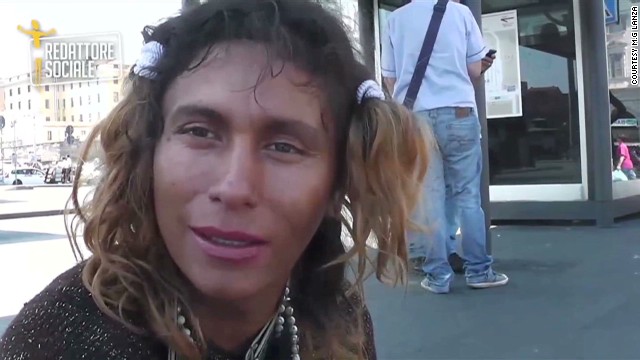Rome, Italy (CNN) -- Andrea Quintero was described by those who knew her as a gentle soul and a devout Catholic.
Transgendered and homeless, she left Colombia for Italy in search of a society that could accept her for who she was -- a man who felt like a woman.
But in Rome it was no different. In fact it was worse. She said her paralyzed arm and prominent limp were evidence of the regular beatings she endured as a drifter at Rome's main railway station. Despite the abuse, she hoped for better.
"I dream of meeting a boy that has money and that will allow me to leave such a terrible life," Andrea said in an interview with an Italian newspaper.
That dream would never come true. On July 29 this year, Andrea's body was found after she had been beaten to death on platform 10 of Rome's main railway station.
That very same day, on a plane ride from Brazil to the Vatican, Pope Francis uttered the five words about homosexuality that have come to define his papacy. "Who am I to judge?" The answer signaled a shift in the relationship between the Catholic Church and the gay community. He said that while homosexuality is still a sin, gay people should not be marginalized.
CNN Vatican analyst John Allen said: "In general what you are going to see is a church that is more compassionate and tolerant, particularly with regard to gays and transgendered persons, but the concern that people might mistake that compassion for a change in church doctrine, that is no longer going to get in the way of outreach."
Months after Andrea's death, her body remained unclaimed in the morgue. Local charity workers decided Andrea needed to be acknowledged with a Catholic funeral. A priest at Chiesa Del Gesu, one of the most prominent Jesuit churches in Rome opened its doors.
"With Pope Francis, we have courage, we have enthusiasm," said Father Giovanni La Manna, who helped organize the funeral. "We have no excuse. We are called to open our hearts."
Charity workers, government officials, even the city's mayor gathered to pay tribute. Andrea's coffin lay amid the church's breathtaking frescos. A Catholic mass was held in her memory.
And then something happened that stunned those inside the church.
Throughout the mass, the priest acknowledged Andrea as a 'She'.
"Up until this point we haven't been acknowledged by the Catholic Church," said Vladimir Luxuria, a transgendered activist who attended the funeral. "It is as if the Catholic Church says 'we see you the way you feel you are.'"
While Andrea's dream of a white church wedding was never possible -- at least in death she was accepted by the religion she believed in so deeply.

No comments:
Post a Comment